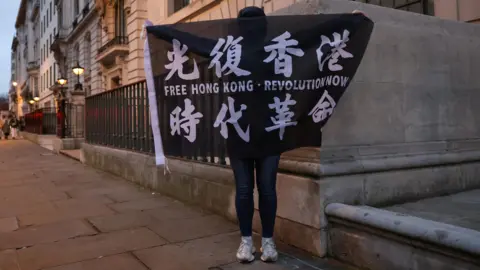In a significant development, the United Kingdom has issued a stern condemnation regarding a recent financial incentive introduced by Hong Kong authorities to seek assistance in arresting pro-democracy activists residing in the UK. The provision of monetary rewards, which reportedly ranges from $25,000 (around HK$200,000) to $125,000, is aimed at individuals who can provide information leading to the capture of 19 activists who have fled Hong Kong. This cash offer has been deemed by UK officials as a blatant example of “transnational repression.”
The joint statement from Foreign Secretary David Lammy and Home Secretary Yvette Cooper emphasized the UK’s firm stance against what they describe as a disturbing trend of Hong Kong leveraging financial rewards to undermine the freedoms of those in opposition to the government. The activists targeted under this bounty are said to have violated Beijing’s national security law enforced in 2020, a measure introduced as a reaction to mass protests against the government in 2019. The UK officials criticized the cash reward strategy, reiterating their commitment to protect the rights and freedoms of these activists living in Britain.
Among the 19 individuals named, some activists are particularly prominent. For instance, Choi Ming-da and Fok Ka-chi are highlighted as key targets. They allegedly ran a social media platform known as “Tuesdayroad.” Furthermore, Nathan Law, a former lawmaker in Hong Kong’s Legislative Council, and Yuan Gong-Yi, a notable commentator and activist, are also included in this list. The financial rewards for the capture of these individuals underscore the risks they face, as Nathan Law himself has expressed increased danger since the announcement of the bounty.
This marks the third time that Hong Kong authorities have issued such cash rewards. The first series appeared in mid-2023 and specifically targeted Nathan Law and Simon Cheng, a former employee at the UK’s consulate who faced detention in Hong Kong back in 2019—a controversial case that gained international attention. The subsequent rewards aimed at pro-democracy activists included others based in both the UK and Canada, such as Tony Chung, the former leader of a pro-independence organization.
Since the implementation of the national security law, there has been a notable exodus of Hong Kong residents seeking refuge in the UK. Notably, a special visa scheme introduced by the UK government in 2021 facilitated the migration of about 150,000 Hong Kong residents, highlighting the broader implications of these political tensions. In November of the prior year, a Hong Kong court sentenced numerous pro-democracy leaders to extensive prison terms for subversion, following a high-profile national security trial that attracted widespread criticism.
Responding to the latest bounty initiative, Lammy and Cooper reaffirmed the UK government’s dedication to stand in solidarity with the people of Hong Kong, especially those who have made the UK their new home. In their statement, they asserted the government’s serious approach toward ensuring the rights and safety of these individuals. They stressed the UK’s ongoing commitment to human rights, the rule of law, and personal safety, declaring the nation’s efforts to definitively sever ties with Hong Kong’s extradition protocols—an action illustrated by the removal of Hong Kong from the Extradition Act 2003.
This incident raises urgent concerns about the increasing hostility faced by activists, and it underscores the ramifications of China’s assertive approach towards dissent. In light of these political dynamics, the UK continues to navigate the complex landscape of international relations while safeguarding the freedoms of those who seek refuge from oppressive regimes. The condemnation not only reflects the UK’s principled stance against repression but also highlights ongoing global discussions surrounding human rights and political asylum in the context of escalating authoritarianism.












